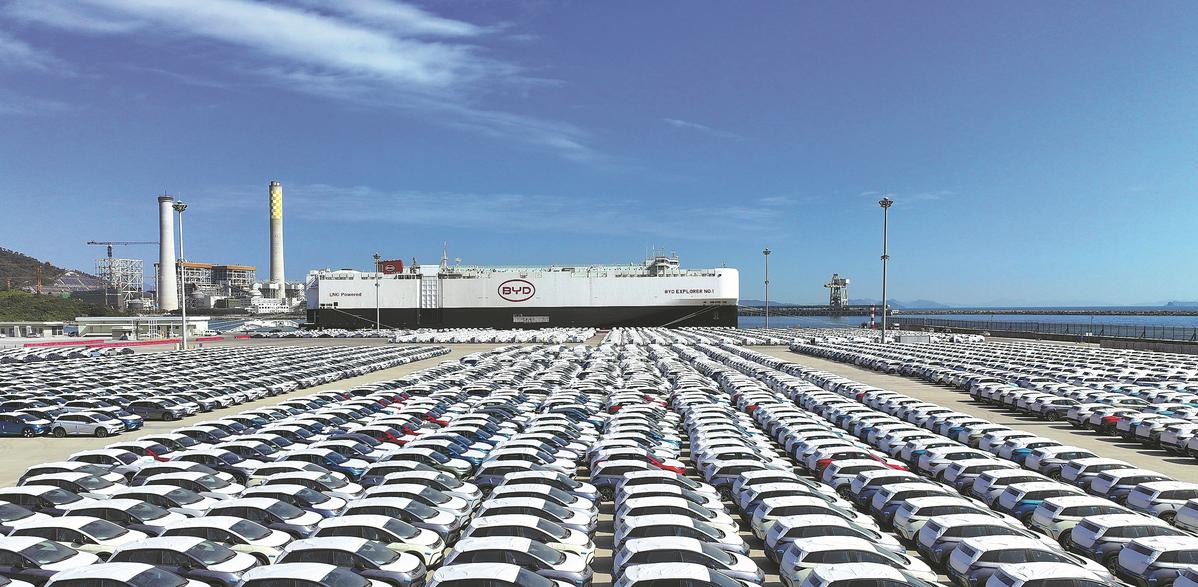
 0 Comment(s)
0 Comment(s) Print
Print E-mail China Daily, February 19, 2024
E-mail China Daily, February 19, 2024

BYD Exporter No 1 embarks on its maiden voyage from Shenzhen in Guangdong province on Jan 15, transporting more than 5,000 vehicles to Europe. [Photo/Xinhua]
Chinese automotive companies are establishing oceangoing car carrier fleets, also known as Ro-Ro ships, to enhance their export capacity and responding to the trend of China-made vehicles being shipped abroad.
In mid-January, BYD's first car carrier, Explorer No 1, leased from the international shipping company Zodiac Maritime, embarked on its maiden voyage, transporting more than 5,000 new energy vehicles to Europe.
The China's largest NEV maker has expanded its business to more than 70 countries and regions. In 2023, BYD exported 252,000 vehicles, a year-on-year growth of 330 percent.
In the next two years, BYD plans to put an additional seven car carriers into operation. According to Wang Junbao, general manager of BYD Corporate Division, the global market for NEVs is substantial and there is significant demand for car-carrier services in overseas export. He envisions a promising future for the Ro-Ro business.
Later in January, SAIC Motor's first locally-invested and built oceangoing car carrier, SAIC Anji Sincerity, took its maiden voyage from Shanghai to Europe. It carried 5,000 vehicles, including SAIC's MG and Maxus models, along with vehicles from Dongfeng Motor and Yutong.
The company plans to expand its Ro-Ro fleet with 14 vessels over the next three years.
SAIC exported 1.21 million vehicles in 2023, up 18.8 percent year-on-year, the eighth consecutive year and the most among domestic automakers.
It aims to export 1.35 million vehicles this year and 1.5 million in 2025, according to Zhao Aimin, deputy general manager of SAIC International.
Meanwhile, Chery Automobile, having placed an order for three car carriers from its shipyard, anticipates the delivery of its first vessel this year.
The automaker exported 925,000 vehicles in 2023.
The ship deliveries come at a time when Chinese automakers are facing challenges in overseas shipments. As Chinese NEV exports gain momentum, the industry is struggling with a shortage of vessels, which has resulted in price hikes for international shipping.
Automakers are opting to own or take out long-term leases of ships, ensuring export stability, reducing transportation costs and guaranteeing timely deliveries to overseas customers, said Cui Dongshu, secretary-general of the China Passenger Car Association.
The era of self-shipping for domestic vehicles has begun, which will bring sustainable advantages to China's automotive export industry, according to Cui.
In 2023, China emerged as the world's largest auto exporter, with vehicle exports reaching 4.91 million units, a 57.9 percent growth year-on-year, according to the China Association of Automobile Manufacturers.
The leading automotive trade association estimates that vehicle exports will reach 5.5 million this year.
Jin Qi, general manager of SAIC Anji Logistics, said that as China's exports reach a certain scale, the security and stability of the supply chain becomes more crucial. With the continuous growth of Chinese automotive exports, an increasing number of car manufacturers may opt to become shipowners.
While building overseas factories will be an inevitable trend, which is more cost-effective than exporting vehicles via Ro-Ro ship transportation. As production localizes, automakers will see substantial profit increases, according to industry experts.